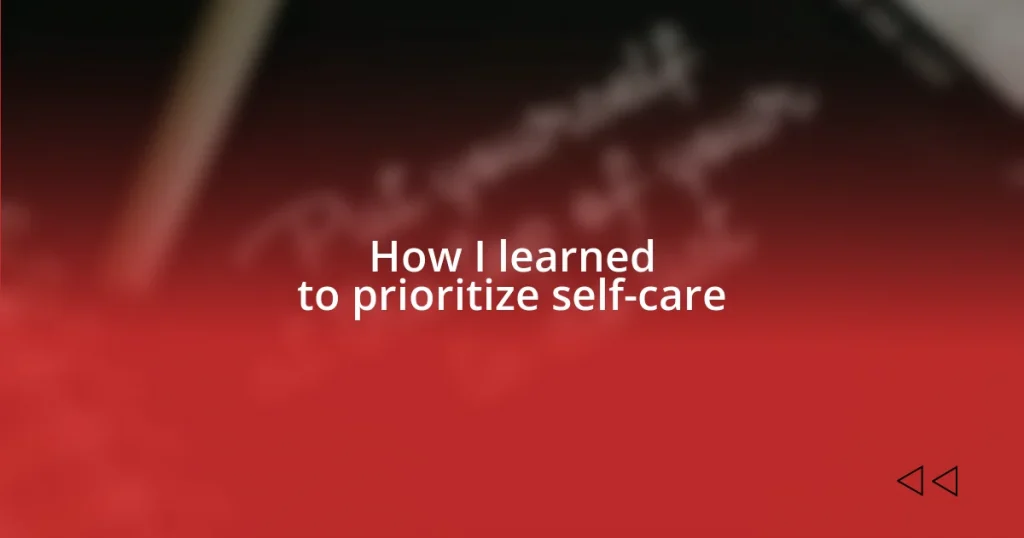Key takeaways:
- Recognizing the necessity of self-care can lead to improved mental and emotional well-being, especially when prioritizing personal needs over responsibilities.
- Creating a customized self-care routine and identifying personal activities that rejuvenate can enhance overall happiness and balance in life.
- Adapting self-care practices to fit changing life circumstances is crucial, allowing for mindful adjustments that prioritize self-awareness and wellness.
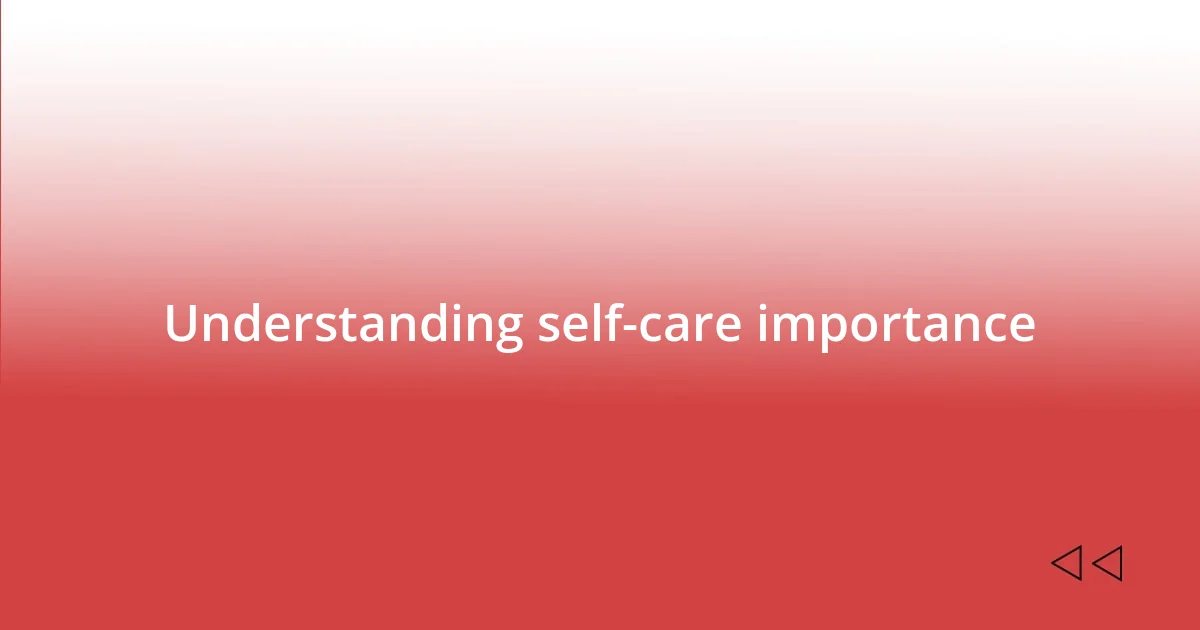
Understanding self-care importance
Self-care isn’t just a buzzword; it’s a vital part of maintaining our overall health. I remember a time when I was so wrapped up in my responsibilities that I neglected my needs entirely. Have you ever felt that overwhelming fatigue creeping in because you prioritized everything and everyone else? It’s a wake-up call when you realize that neglecting self-care leads to burnout and decreased productivity.
Taking time for myself was a revelation. I learned that self-care isn’t selfish; it’s essential. When I began setting aside just a few minutes each day for activities I enjoyed—like reading or taking a walk—I noticed a significant shift in my mood and energy levels. How can we expect to show up fully for others if we don’t first take care of ourselves?
Understanding the importance of self-care went beyond just physical activities; it also meant addressing my mental and emotional health. I started journaling my feelings and reflecting on my days, which was both calming and enlightening. We often push through our emotions, but when we acknowledge them, we create a healthier mental space. Isn’t it fascinating how small shifts lead to profound changes in our perspective?
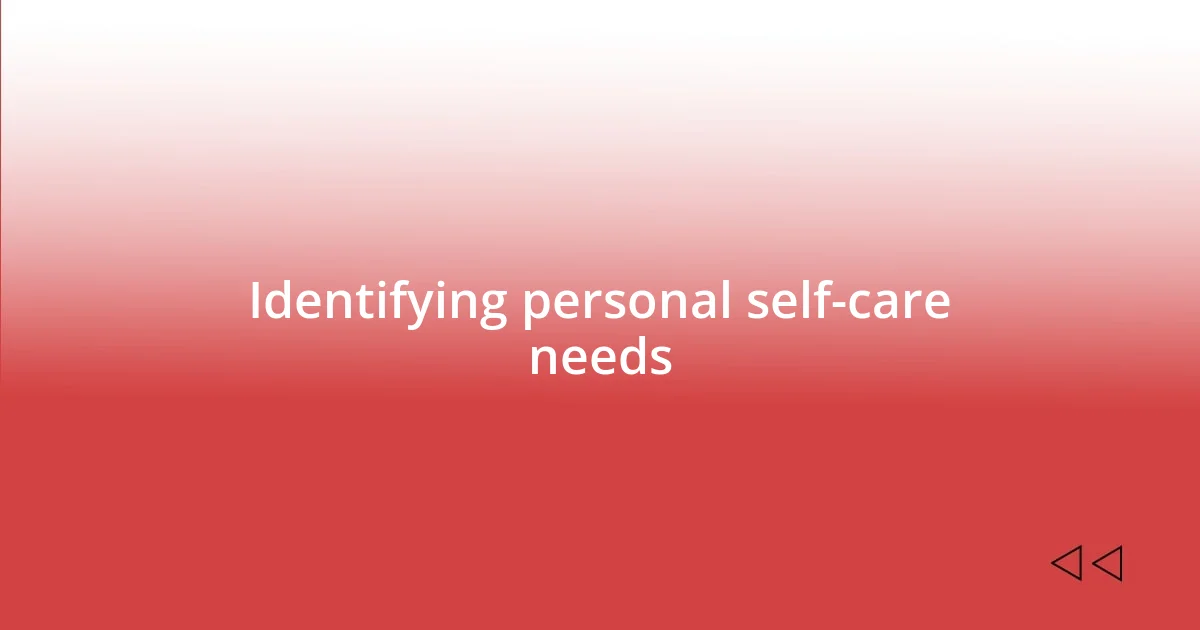
Identifying personal self-care needs
Identifying personal self-care needs is a deeply personal journey. When I first started exploring what self-care meant for me, I realized that it wasn’t just about spa days or relaxation. I needed to sit down and reflect on what truly made me feel recharged. For instance, I discovered that listening to music while lighting my favorite candle brought me immense joy. What about you? Have you taken the time to really ask yourself what lifts your spirits?
Another pivotal moment for me was tracking my emotions and daily activities. Initially, I didn’t realize the toll my hectic lifestyle was taking on my mental health. After jotting down my feelings for a week, it became clear that I craved time in nature. It’s interesting how putting pen to paper can reveal patterns we often overlook. By identifying what activities drained me and which ones replenished my energy, I could focus on what truly mattered.
To streamline your own process of identifying self-care needs, I recommend creating a simple comparison chart for activities. This has worked wonders for me in honing in on what to prioritize. Below is a table that outlines common self-care activities and their effects, which can serve as a starting point for your self-reflection.
| Self-Care Activity | Effect on Well-Being |
|---|---|
| Walking in nature | Boosts mood and energy |
| Meditation | Reduces stress and enhances focus |
| Reading | Provides escape and relaxation |
| Creative hobbies | Increases happiness and fulfillment |
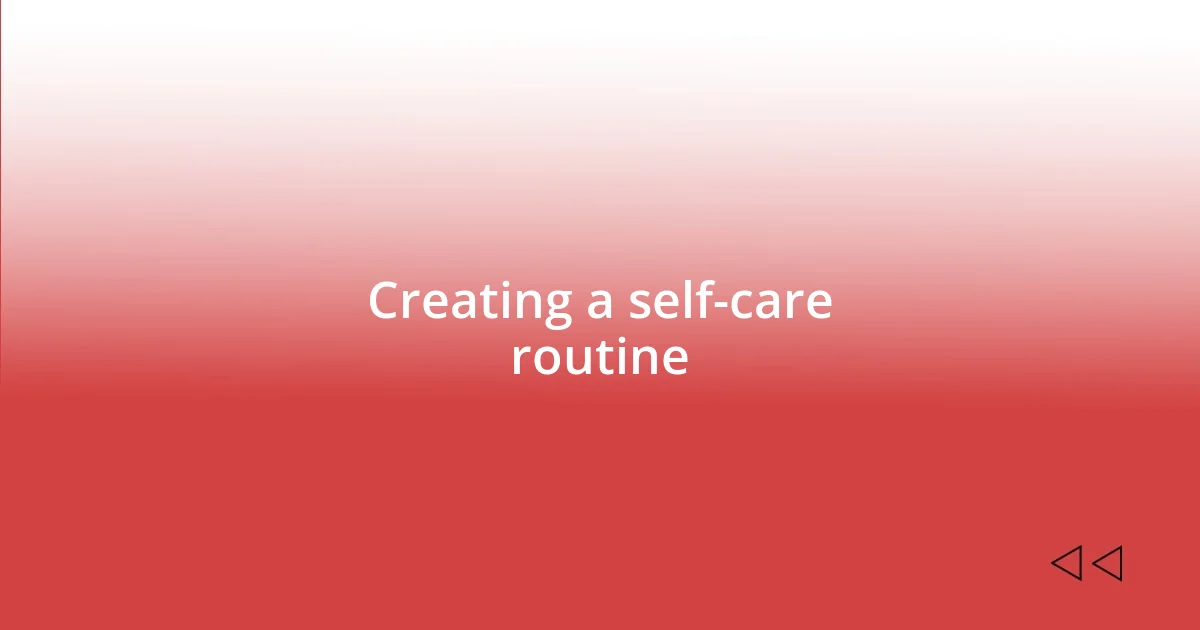
Creating a self-care routine
Creating a self-care routine is akin to crafting a gentle rhythm in your life. I remember when I first committed to making it a daily practice, it felt like an act of defiance against my chaotic schedule. Even just five minutes in a cozy spot with a warm cup of tea became sacred. It underscored an essential truth: sometimes, we need to prioritize ourselves to better support those around us.
To build a solid self-care routine, I found that a mix of structure and flexibility works best. Having a list of go-to activities keeps me accountable while allowing room for spontaneity. Here are some ideas to consider as you shape your own routine:
- Morning stretches or yoga to energize the day
- A mid-afternoon mindfulness break to reset your focus
- Evening rituals, like reading or a warm bath, to unwind
- Weekly outing to your favorite park to reconnect with nature
- Scheduled time for hobbies that bring you joy or satisfaction
Remember, the key is to find what resonates with you personally. It’s all about nourishing your unique needs and preferences, making it a journey tailored just for you.
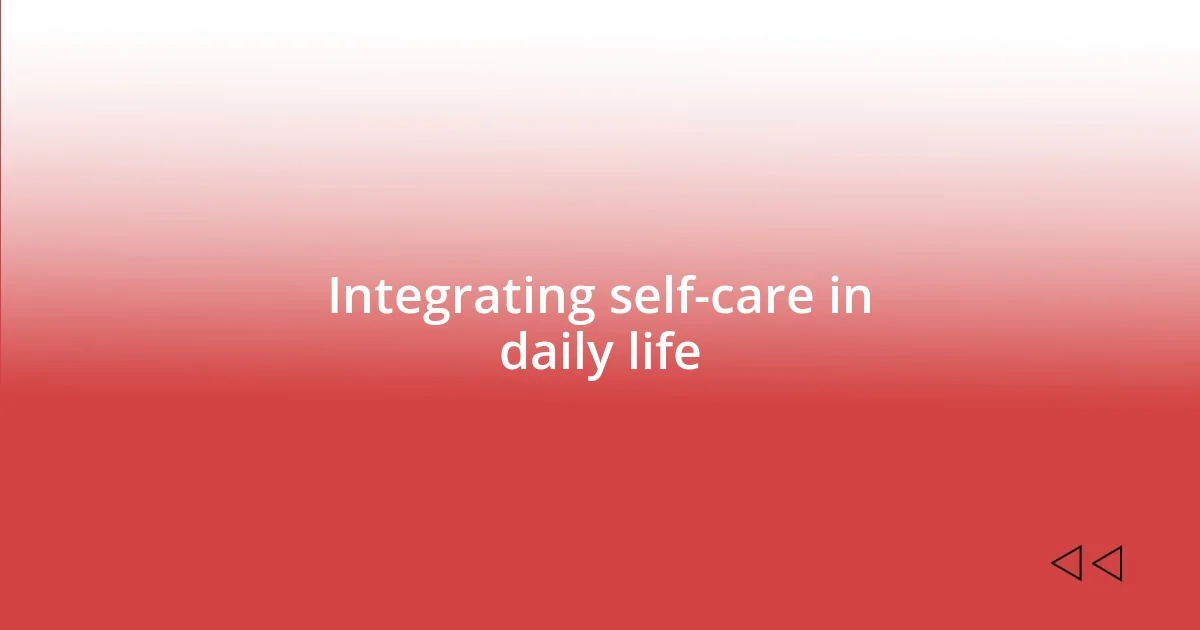
Integrating self-care in daily life
Integrating self-care into daily life can feel challenging, but I’ve discovered that small, intentional changes make a significant difference. For instance, I started setting reminders on my phone to take brief breaks throughout my day. At first, I was skeptical about this practice, fearing it might disrupt my flow, but those few moments to breathe and stretch often left me feeling rejuvenated and more focused. Have you ever noticed how a little pause can lead to a much clearer mind?
Another tactic that really worked for me was infusing self-care into everyday tasks. I began treating mundane activities, like washing the dishes or commuting to work, as opportunities for mindfulness. Instead of scrolling on my phone, I listened to uplifting podcasts or simply focused on the sensations around me. It’s fascinating how reframing our perspective can turn routine chores into nourishing experiences. What routines do you have that you could elevate to an act of self-care?
Lastly, accountability has played a crucial role in my journey. I connected with a couple of friends who share similar self-care goals, and we check in with each other regularly. This support system has not only fostered consistency but also enriched our friendships. It’s become a ritual we all look forward to, which got me thinking—who in your life could you involve in your self-care journey? Sometimes, sharing the experience can amplify its positive effects.
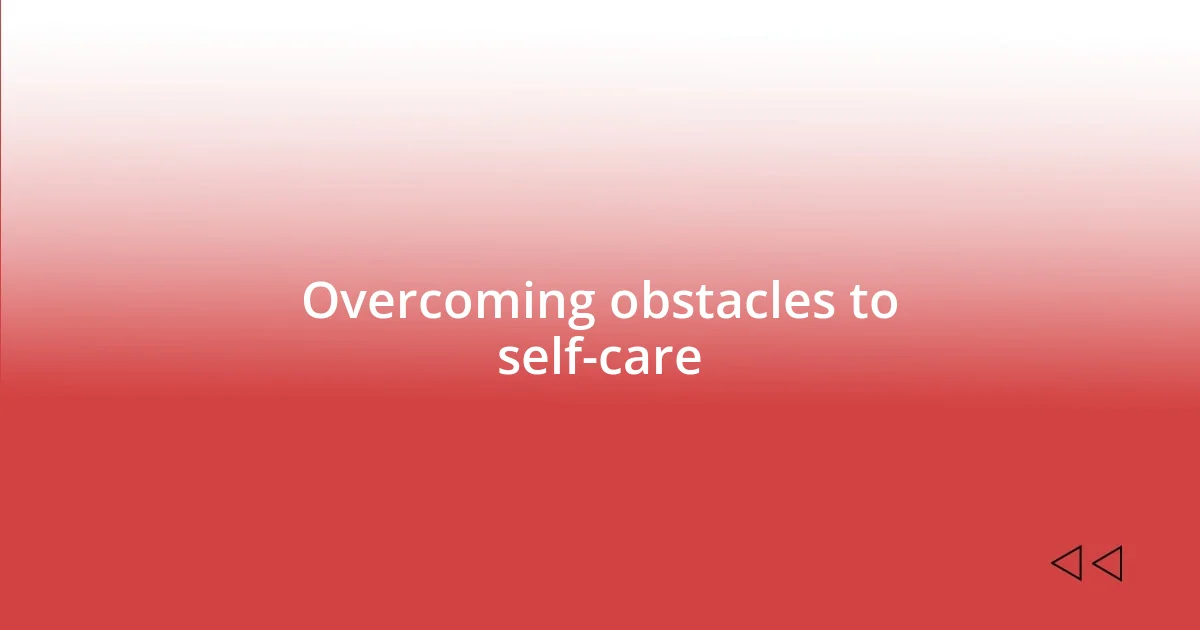
Overcoming obstacles to self-care
Finding ways to overcome obstacles to self-care has been a transformative experience for me. I vividly recall the days when guilt would creep in as I set aside time for myself. It felt like I was selfishly stealing moments that could have been spent working or caring for others. But one afternoon, I decided to reflect on that guilt; I asked myself, “What kind of support can I offer others if I’m running on empty?” That realization sparked a shift in my mindset.
Another major hurdle has been carving out time in my busy schedule. I remember a period where every hour seemed booked solid. To tackle this, I began viewing self-care as non-negotiable. Instead of squeezing it in wherever possible, I started blocking out time on my calendar for it, just as I would for an important meeting. The empowerment of seeing self-care as a priority deeply enhanced my commitment. Have you considered that kind of bold approach to your own schedule?
I’ll admit, there are days when life throws curveballs, and honoring self-care feels impossible. One evening, after a particularly draining day, I felt like skipping my meditation practice. But then I remembered how much it had helped me in the past. Instead, I turned on a calming meditation playlist and let it wash over me while I sat in my favorite chair. I learned that even on tough days, showing up for myself, even if it’s just a few minutes, can shift my entire perspective. It’s moments like these that remind me why overcoming these obstacles is not just important, it’s essential.
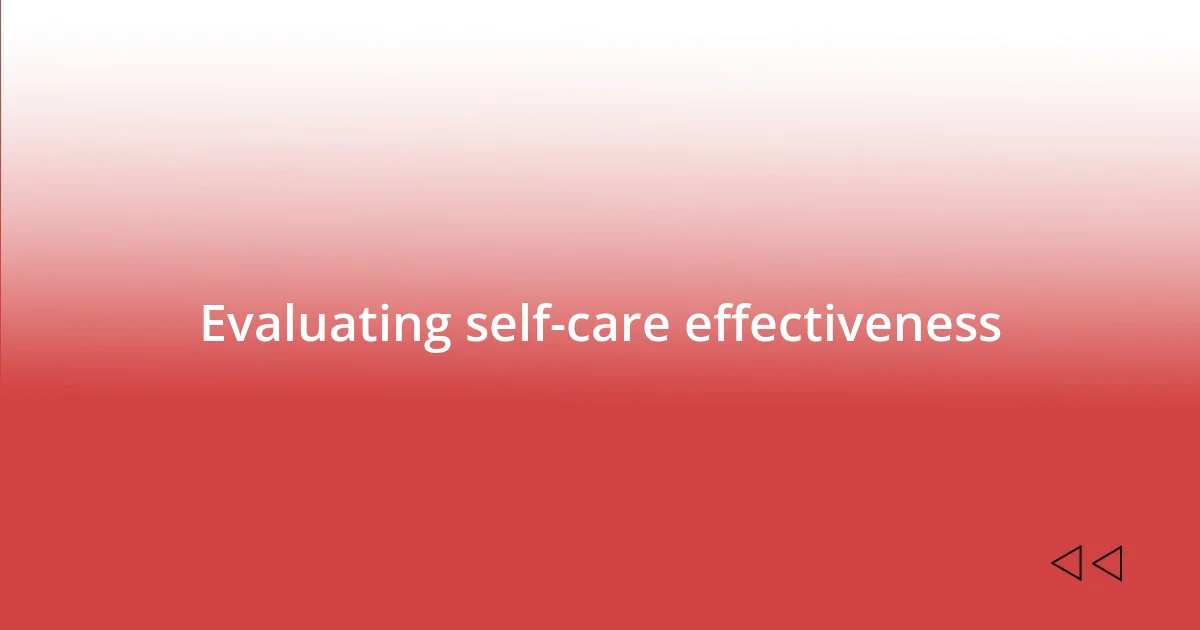
Evaluating self-care effectiveness
Evaluating the effectiveness of my self-care practices has been an enlightening journey. I started by reflecting on how I felt before and after engaging in different self-care activities. For example, after taking a walk in nature, I noticed an immediate lift in my mood; my anxiety seemed to evaporate, and I often left with a clearer mind. Isn’t it fascinating how those simple moments can have such profound impacts?
Tracking my self-care activities in a journal has also been instrumental in this evaluation process. I’d jot down my feelings each time I tried something new—be it journaling, yoga, or simply enjoying a quiet cup of tea. Over time, I could pinpoint which activities consistently boosted my well-being and which ones fell short. This awareness has been empowering, allowing me to focus on the self-care practices that truly resonate with me. Have you ever thought about keeping a record of what makes you feel good?
Additionally, I’ve learned to check in with myself regularly, almost like a mini self-assessment. Some days, I would ask, “Am I feeling more balanced today?” or “Did I truly connect with myself during this activity?” These questions encourage a deeper understanding of my needs. It’s remarkable how being honest with myself about the effectiveness of my self-care can lead to clearer choices moving forward. What self-care tactics have you evaluated lately, and what did those reflections unveil about your own journey?
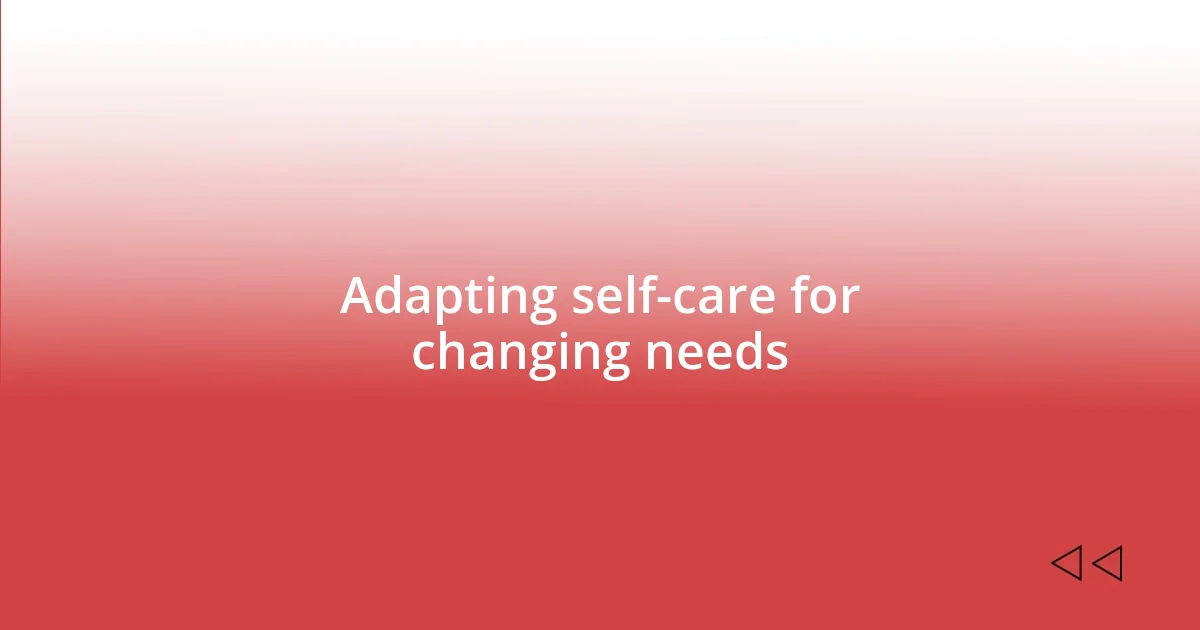
Adapting self-care for changing needs
Adapting my self-care routine has become crucial as my life evolves. I remember when I had more time to unwind with a good book or indulge in long baths, but with changing commitments, it sometimes felt impossible to fit those in. I found it essential to recognize what I truly needed at different stages; scheduling shorter, mindful breaks became my go-to. Have you ever considered how shifting your perspective on self-care can help you navigate new challenges?
One key moment for me was when I transitioned to remote work. Initially, I struggled to maintain boundaries; my home workspace was often chaotic. I experimented with brief breathing exercises throughout the day, and those few moments of mindfulness helped center my thoughts. It’s amazing how adapting self-care practices can not only improve focus but also restore a sense of calm amid the chaos. What small adjustments have you made that made a significant difference?
Recently, I’ve learned the importance of trial and error in self-care. On days when a long workout just isn’t feasible, I switch to stretching or a quick walk around the block. Recognizing that my needs are fluid helps me adapt my approach without guilt. I often ask myself, “What does my body need right now?” This simple question guides my choices and reminds me that self-care isn’t about perfection—it’s about being present and listening to myself. Have you found ways to tune into your body’s changing needs as well?










